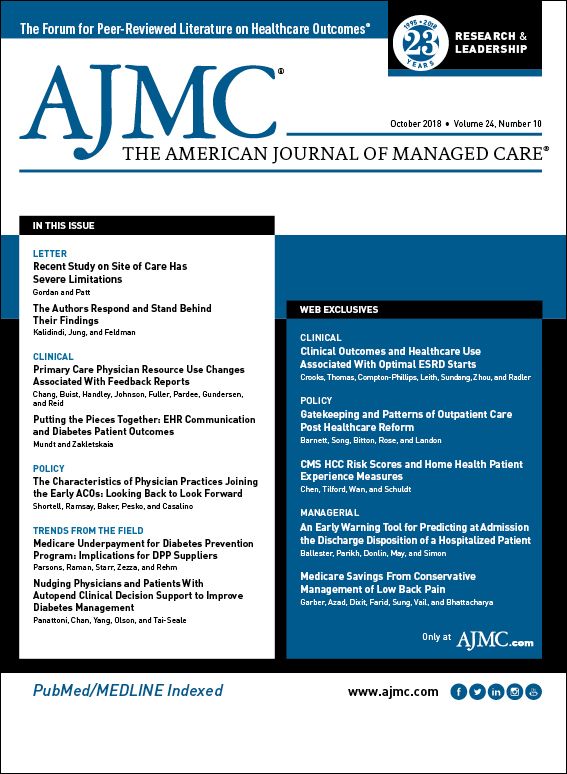- Center on Health Equity & Access
- Clinical
- Health Care Cost
- Health Care Delivery
- Insurance
- Policy
- Technology
- Value-Based Care
Recent Study on Site of Care Has Severe Limitations
The outpatient community oncology setting is consistently less costly for cancer treatment as opposed to the outpatient hospital setting.
Am J Manag Care. 2018;24(10):450A recent study published in the July 2018 issue of this journal by Kalidindi et al attempts to compare chemotherapy and administration costs in the outpatient clinic setting versus hospital outpatient departments (HOPDs) for Medicare beneficiaries.1 The study has several limitations: (1) It does not account for the adjustment by comorbid illnesses and cancer stage; (2) the 2 populations of patients studied were quite different, as exemplified by the severe imbalance in cancer types; and (3) there is a lack of detailed information as far as rigorous statistical analysis.
We specifically note that the lack of accounting for comorbid illness and stage of cancer calls into question if the cohorts used in the analysis were balanced. While stage information is not routinely available in the Medicare supplemental file, the authors should have been able to investigate for comorbid illness with the commonly used Deyo-Charlson Comorbidity Index.
Although the study information provided is thought-provoking, it fails to meaningfully contribute to the field of healthcare cost research given its significant constraints. It is very narrowly focused because it does not (1) comprehensively look at all of the costs related to chemotherapy by site of service, (2) factor in the increasing use of oral oncolytics, or (3) analyze the total cost of cancer care.
All costs associated with chemotherapy must include supportive care drugs, to prevent and treat nausea and infusion reactions, and the supplemental therapies that patients with cancer receive. It is unclear if the authors specifically included the cost of growth factors that are often administered with chemotherapy. Many supportive care therapies can increase the cost of care significantly, and their omission biases the total cost of treatment related to following treatment guidelines.
In a striking omission, the authors failed to include other expenditures associated with chemotherapy administration that vary by site of service. These include facility fees that are an additional charge at HOPDs but not in the physician office. Facility fees are incremental charges billed to patients receiving care in HOPDs and often represent noteworthy out-of-pocket expenses for patients.
Finally, looking solely at Medicare-related costs of chemotherapy and administration does not provide an accurate view of the cancer treatment payment landscape, because Medicare is an outlier in terms of differential contracting in comparison with commercial insurance plans. In a study recently published by Winn et al,2 researchers found that the total cost of cancer care in HOPDs was approximately double (per day and at 6 months) compared with the cost in the physician office setting. Specifically, spending at the drug level was significantly lower in physician offices versus in HOPDs ($1466 [95% CI, $1457-$1474] vs $3799 [95% CI, $3761-$3836]; P <.001). Day-level spending also was lower for patients treated in physician offices ($3502 [95% CI, $3490-$3515] vs $7973 [95% CI, $7927-$8019]; P <.001). Total reimbursement during the 6-month treatment episode again was lower in physician offices ($43,700 [95% CI, $42,885-$44,517] vs $84,660 [95% CI, $82,969-$86,352]; P <.001).2 Evaluating the commercial payer space demonstrates a substantially increased cost at HOPDs compared with physician offices.Author Affiliations: Quality/Informatics, Florida Cancer Specialists and Research Institute (LNG), Fort Myers, FL; Texas Oncology (DP), Austin, TX.
Source of Funding: None.
Author Disclosures: Dr Gordan is a board member of Florida Cancer Specialists and American Oncology Network and is employed by Florida Cancer Specialists. Dr Patt is employed by Texas Oncology.
Authorship Information: Concept and design (LNG, DP); acquisition of data (LNG, DP); analysis and interpretation of data (LNG, DP); drafting of the manuscript (LNG, DP); critical revision of the manuscript for important intellectual content (LNG, DP); statistical analysis (LNG); administrative, technical, or logistic support (LNG, DP); and supervision (DP).
Address Correspondence to: Lucio N. Gordan, MD, Quality/Informatics, Florida Cancer Specialists and Research Institute, 6420 W Newberry Rd, Gainesville, FL 32605. Email: lgordan@flcancer.com.REFERENCES
1. Kalidindi Y, Jung J, Feldman R. Differences in spending on provider-administered chemotherapy by site of care in Medicare. Am J Manag Care. 2018;24(7):328-333.
2. Winn AN, Keating NL, Trogdon JG, Basch EM, Dusetzina SB. Spending by commercial insurers on chemotherapy based on site of care, 2004-2014. JAMA Oncol. 2018;4(4):580-581. doi: 10.1001/jamaoncol.2017.5544. 


